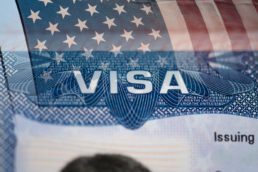Foreign nationals who wish to “adjust” their non-immigrant status to immigrant status (permanent resident status) often have several questions about their current status while the adjustment is pending.
Here are some frequently asked questions to help you better navigate the adjustment of status process.
Q: Can I travel while my Adjustment of Status is pending?
In order to travel while your adjustment of status is pending, you will need a travel document called an Advanced Parole (AP). This is critical as traveling without an Advanced Parole can be considered abandoning your application and will terminate the process.
The Advance Parole document is typically applied for on Form I-131 and is usually included as part of the standard Adjustment of Status package.
Advance Parole will grant permission for a foreign national who is applying for a green card to leave the country and re-enter while the green card petition is still pending. For more information on Advanced Parole, click here.
Q: Does traveling under Advanced Parole affect my current status?
When you re-enter the U.S. with your Advance Parole travel document, you will continue to hold whatever status is valid. If your Advanced Parole (AP) expired while you are abroad, however, you cannot apply for a new AP from outside the U.S. and your Adjustment of Status application will be considered abandoned and will be terminated.
For H-1B or L-1 status applicants, it’s important to keep in mind that changing employers immediately after being paroled back into the U.S. can mean you will lose your H-1B or L-1 Status. Because of this, we recommend changing employers before traveling abroad if you wish to retain your H-1B or L-1 status.
Q: What is my non-immigrant status while my adjustment of status is pending?
While your current status is valid, you continue to live in the U.S. under that status. For example, if you are in H-1B status and your adjustment of status application is pending, you will continue to be in H1B status until it expires. After that, if you do not renew your H-1B status, it will automatically change to I-485 pending status.
Q: Do I have to renew my current non-immigrant status while my case is pending?
It is not legally necessary to renew your non-immigrant status, as your status will automatically switch to I-485 pending status when your current status expires, however, we recommend our clients maintain a valid and separate legal status which will allow you to stay in the U.S., if by any reason your adjustment application is denied suddenly.
In order to maintain H-1 or L-1 status, you will need to continue to extend your H-1 or L-1 status and always re-enter the U.S. under that status after traveling abroad.
Q: Can I travel back to my home country and apply for a work visa while my adjustment of status is pending?
Yes. You can travel back to your home country with an Advanced Parole, apply for an H-1B/L-1 visa there, and then re-enter the U.S. on the H-1/L-1 status as long as this is done within the case pending period.
Q: Can I work while my adjustment is pending?
Yes. You can work under your current non-immigrant status as long as it is valid, however, unless you are an H-1B or L-1, your non-immigrant status cannot be extended once you have applied for an I-485. In that case, you can apply for the Employment Authorization Document (EAD). Click here to read more information about EAD cards.
Q: I have an EAD but I have never used it to work. Will this affect my Adjustment of Status case?
No. This will not affect your case. For H-1/L-1 status holders, it can often be better not to use your EAD and maintain your non-immigrant status instead. But it’s good to hang onto your EAD card in case any problems arise with your non-immigrant status.
Furthermore, simply obtaining the EAD does not affect your status. It is only if and when you start to work using the EAD that your H-1 or L-1 status is switched to I-485 pending status.
Q: Can I change my employer while my Adjustment of Status case is pending?
Yes, if you are applying through an employment-based (EB) category. The Portability Rule allows you to change the sponsoring employer as long as your case is pending (with the condition that the new job falls under the same classification as the current job for which the petition was filed).
This can be done only after 180 days have lapsed from either the filing of adjustment of status or the approval of the I-140 petition. Read more about the Portability Rule.
Q: If I re-enter the U.S. using my Advanced Parole Document, will changing employers afterwards affect my status?
Yes. If you have recently traveled abroad under Advanced Parole and change your employer immediately after re-entering U.S., this will automatically terminate your H-1 or L-1 non-immigrant status.
While you can stay and work in the U.S. using an EAD lawfully in this situation, it is only valid while the I-485 is pending. If your I-485 application is denied for any reason, you are automatically without any legal status.
Q: What if my new employer doesn’t sponsor my H1/L1 extension?
In case your new employer does not sponsor your H-1 or L-1 extension, you will lose your H-1/L-1 status once they are expired and be switched to I-485 Pending status.
You can continue working with your new employer using your EAD. Just make sure you obtain your EAD before your H-1/L-1 status expires to avoid any gap in status.
Q: Can I add more dependents while my application is still in pending status?
Yes, if your priority date is current. You can file I-485s for your spouse and children either along with your application or at any time before your case is adjudicated, as long as they are in the U.S. under a valid non-immigrant status.
However, if you are a primary applicant with a pending Adjustment and you are subject to the visa backlog (i.e. your priority date is not current), then your dependents cannot file an Adjustment application until your priority date becomes current. Applicants and dependents in this situation must be diligent about checking the monthly visa bulletin and filing the dependent’s I-485 application in a timely manner. If the primary applicant’s Adjustment application is approved before the I-485 for a spouse or children is filed, the dependents will no longer have underlying nonimmigrant status and will not be able to Adjust.
Q: If I marry during the I-485 pending period, can my spouse apply for Adjustment of Status?
If you are on a valid H-1/L-1 visa and marry during the pending period, your spouse will first have to change his or her status to H-4 or L-2 and then apply for the Adjustment of Status within the pending period.
If your spouse is already residing in the U.S., then he or she will have to file for change of status before applying for I-485.
If your spouse is residing abroad, then you will have to file Form I-824 Application for Action on Approved Application or Petition, either along with or after filing your adjustment of status petition. This will speed up your dependent’s immigration to the U.S. in case your application is approved.
Q: If my child is born while my adjustment of status is pending, can I apply for his/her Adjustment of Status as well?
If your child is born in the United States, he or she automatically becomes a U.S. citizen.
If your child is born abroad, however, you would need to follow the same process described above and file Form I-824 for your dependent’s immigration to the U.S.
If you are interested in applying for a green card or have questions on the adjustment of status process, please contact our office to schedule a consultation with one of our attorneys today!
Ready to have Berardi on your side?
Whether you’re a business looking to hire or a professional hoping to relocate, immigration law can be complicated. But you don’t have to do it alone. Put our experience to work for you.



